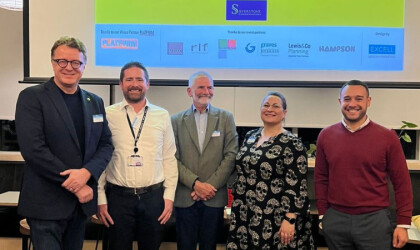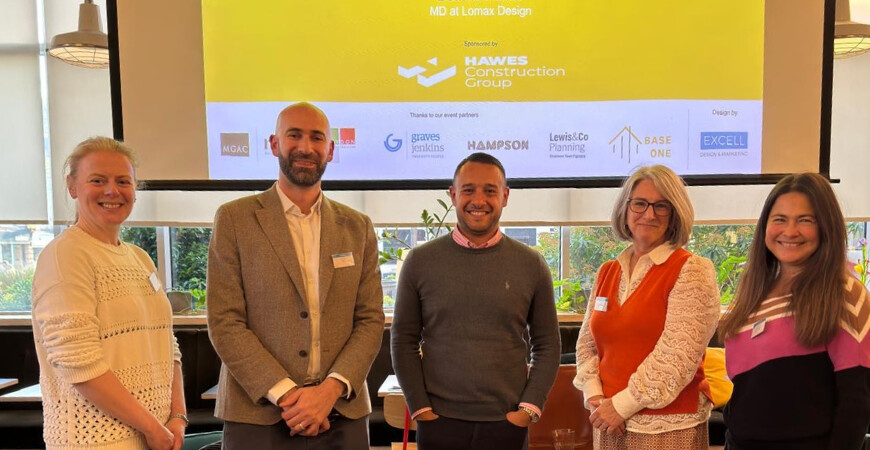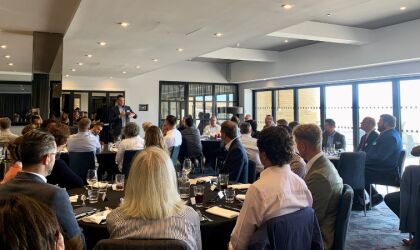

Fri 03 / 05 / 24
Construction Voice: Unpacking the construction career crisis
Writing after our latest Construction Voice panel event, Flo Powell, Joint Managing Director at Midnight Communications shares the key points and highlights from the discussion around the construction career crisis.
By Flo Powell of Midnight Communications
For our first Construction Voice of the year we brought the sunshine to PLATF9RM in Hove for another lively discussion, this time on why people aren’t choosing construction as a career.
Organised by the wonderful Brighton Chamber team, chaired as always by Ed Allison-Wright, supported by event partners MGAC, Haydon Consulting, Graves Jenkins, Hampson Architects, Lewis & Co Planning and Base One and this time sponsored by Hawes Construction Group.
I reflected that a good number of attendees, me included, have attended every single one of these events in the last few years. If you work in the property and construction industry, it’s become the unmissable chance to meet the who’s who in the industry locally, catch up and discuss a pertinent topic which affects us all.
There’s always an attendance by senior figures from Brighton & Hove City Council and this time was no exception with Assistant Director of City Development and Regeneration, Max Woodford, and planning committee member Cllr Julie Cattell along with Chair of the Culture, Heritage, Sport, Tourism & Economic Development Committee, Cllr Alan Robins, all in the audience.
Construction is facing some significant challenges in terms of its workforce. The Construction Skills Network (CTN) reported that by 2027, the UK construction sector will need an additional 225,000 workers to meet demand, which is roughly 45,000 new workers a year. However, women only make up around 16% of the workforce and the sector is suffering from ‘brain drain’ with the loss of senior skilled workers choosing to retire, switch careers or emigrate for better working conditions. The industry is struggling to recruit young people, struggling to improve diversity and inclusion and losing good people – add continued economic uncertainty and the increasing cost of building materials, it’s a bit of a perfect storm at the moment.
Lucy Brown, Senior Project Manager at MACE has worked on some big projects including HS2 and Tottenham Hotspur stadium to name a few. Lucy explained that she thought the issue starts at school level, with a misunderstanding of the construction industry, the types of roles available and the skills and qualifications needed. She called for more construction companies to engage with local schools and go and talk to the kids to inspire and educate.
Construction struggles with a perception problem. Something we discussed at the last event when I was on the panel, talking about its reputation from a PR perspective. The general feeling in the room is that construction is seen as purely manual labour with long hours spent outside in the rain, getting dirty. Once you can explain all the opportunities that are available, the different positions and career paths, as Lucy said, children’s eyes light up.
Dara Jafari, Director at MGAC, is a chartered surveyor whose father worked in construction and started out on building sites. Sadly, he relayed some of the racism he’d experienced to Dara but thankfully that didn’t deter him from joining in the industry himself, instead choosing to embrace construction and support change. Dara also mentioned that young women and ethnic minorities are leaving the industry more so than any other demographic. Dara’s been investigating why and explained that a simple solution is to ask them – he’s been organising roundtables to get honest and critical feedback to take to board level.
Sarra Hawes, Director of Hawes Construction Group and Chair of Sussex Construction Excellence Sussex Group, is also involved in skills development groups in the region and is passionate about getting more women and young people into the industry. Sarra called for more women in the industry to become role models.
One of the barriers to entry isn’t just students’ perception of the industry but their parents are also part of the issue. Sarra has seen parents visibly pull their children away from her stand at career fairs. When she explains to them that it’s a career for life with good prospects, she can turn that around, but only if they are willing to listen.
Beatriz Huezo, MD at Lomax Design is an architect and was heavily involved in the Hippodrome project which finally received planning consent recently (queue applause). Bea explained that she didn’t think the balance of effort and reward was good enough in the UK to keep people in the industry, which is impacting the increase of ‘brain drain’. The significant costs of university education (the standard is now £85k outside London and more than £100k in the capital) also deters people from studying subjects such as architecture.
There are apprenticeships now for young people to take instead of the traditional university route, but more companies need to offer them and a lot of businesses in construction, including architecture, are SMEs and micro businesses that might consider themselves too small to take on apprentices. This isn’t true – any business of any size can take on an apprentice and Hawes Construction Group has proved this themselves with one of their success stories, Emily, sitting in the audience.
Emily met Sarra four years ago when she was 17 and wasn’t sure which direction to take for her career…she’s now a civil engineer. Emily is now paying it forward by encouraging more young people and women to join the industry by talking about her career path. An incredible example to us all of what can be done with focus and determination, both in terms of Sarra’s efforts in inspiring Emily to choose her career and in Emily making it happen.
Lucy felt more investment was needed in career development and support for women in construction. Often, they are pushed through the ranks into senior roles, but then not supported enough to sustain those senior positions. There are networks available including the Women in Construction membership group for support.
Ed suggested that construction should look to the example of how the aviation industry has succeeded in improving under-representation of female pilots through the tactical use of role models and school engagement to improve children’s unconscious bias regarding genders and career roles.
Dara warned we need to be careful not to be too tokenistic when pushing minorities to the front as role models – it’s happened to him. This is necessary to change bias but needs care and tact.
Suggestions from the audience included visiting schools and training students for free or physically building something with them that’s useful in the community or for the school. Geri Silverstone from Silverstone Communications is also Chair of Governors at Cardinal Newman and offered anyone interested in speaking to the students to contact him.
In terms of how we reach young people aside from school engagement, Dara suggested we look beyond LinkedIn as our preferred social platform and use platforms such as TikTok that have a younger demographic.
The conversation then turned to the challenge of local businesses and trades not being hired for major projects in the city. Examples had been heard of plasterers coming from places like Watford for local jobs. The council has a list of local businesses that they suggest to outside developers and contractors to use and it stipulates 20% local labour but it’s difficult to enforce. Cllr Robins suggested it could be made a stronger suggestion at planning stage. The council is launching a campaign this summer to promote construction roles…watch this space.
Bea suggested the industry look to other examples of success for inspiration including a housing supplier in Manchester which is taking on underprivileged young people and training them up to take on retrofitting projects, or construction companies employing ex-offenders.
Another great example of success came from Craig Silver at Close Brothers Property Finance who had recently funded a development of two houses built by a team of hearing-impaired contractors. A useful reminder that we mustn’t forget physical and neurodivergent disabilities when we’re checking our unconscious bias and looking to improve diversity in the industry.
Clearly the apprenticeships route is a good way for the industry to get more young people into construction. Dr Helen Walker from the University of Brighton encouraged anyone interested to get in touch to talk about their degree apprentice programmes.
At Midnight, we’re on our own journey to improve diversity and inclusion and can recommend local training company Watch This Sp_ce for its courses and inclusive recruitment programme.
In summary, everyone who works in the construction industry can help by promoting their own careers and writing about why they love their job on social media, engaging with schools, talking to kids, and going along to careers fairs, becoming role models and supporting others. We might be facing a perfect storm, but we can all do our bit to help turn it around.
With thanks to Flo Powell, Join Managing Director at Midnight Communications for writing up the panel discussion. Find out more about Midnight on their website.
Construction Voice brings together our city's leading figures from the construction and property sector - creating a space for architects and developers; surveyors and builders; politicians and planning officers to have a say on the topics that are important to our city. Construction Voice is run by Brighton Chamber with event partners MGAC, Haydon Consulting, Graves Jenkins, Hampson Architects, Lewis & Co Planning and Base One.
With thanks to our sponsor, Hawes Construction Group.
If you want to contribute to the Chamber blog, contact us on hannah@brightonchamber.co.uk



